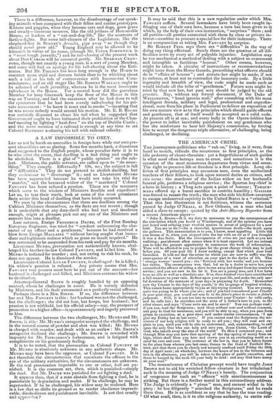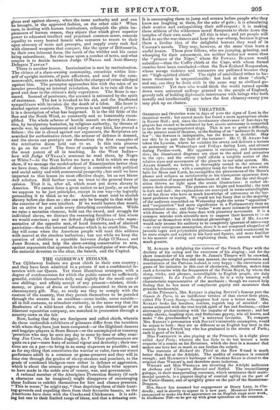THE AMERICAN CRIME.
THE journeymen-politicians who "rub on," living, as it were, from hand to mouth, ridicule the recurrence to first principles, as the idle pedantry of closet-theorists : yet a forgetfulness of such guides is what most often betrays men to error, and sometimes it is the occasion of the most monstrous departures from virtue and sense. The right to preserve life or freedom is a first principle. Long ob- livion of first principles may accustom men, even the authorized teachers of their fellows, to look upon natural duties as crimes, and vice versa : the murderer of the Indian widow on her husband's funeral pile, performs a religious service ; the Spartan boy-thief is a hero in history ; a Thug acts upon a point of honour ; TORQUE-. MADA. offered up a burnt sacrifice in contrite humility ; GA.Linso was forced to recant the truth; the man who aids his fellow-creature to escape undeserved captivity in the United States is a "criminal" That this last illustration is not fictitious, witness the sentence passed by Judge O'Nnar..n, at New Orleans, on a man who had aided a slave to escape ; quoted by the Anti-Slavery Reporter from a recent American paper— "John L. Brown—It is my duty to announce to you the consequences of the conviction which you heard at Winshorough, and of the opinion you have just heard read refusing your twofold motion in arrest of judgment for a new trial. You are to die !—die a shameful, ignominious death—the death upon the gallows. This annunciation is to you, I know, most appalling. Little did you dream of it, when you stepped into the bar with an air as it you thought it was a fine frolic. But the consequences of crime are just such as you are realizing: punishment often comes when it is least expected. Let me entreat you to take the present opportunity to commence the work of reformation. Time will be afforded to you to prepare for the great change which may be just before you. Of your past life I know nothing, except that which your trial furnished. It told me that the crime for which you are now to suffer was the consequence of a want of attention on your part to the duties of life. The strange woman' snared you; she flattered with her words,' and you became her victim. The consequence was, that, led on by a desire to serve her, yon committed the offence of aiding a slave to run away and depart from her master's service; and you are now to die for it. You are a young man, and I fear have been an idle as well as a dissolute one. If so, these kindred vices have contributed a full measure to your ruin. Reflect upon your past life, and make the only use- ful devotion of the remnant of your days in preparing for death. 'Remember now thy Creator in the days of thy youth,' is the language of inspired wisdom. This comes home appropriately to you at this trying moment. You are young, quite too young to be where you are; and if you had remembered your Creator in your past days, you would not now be in the felon's place to receive a felon's judgment. Still, it is not too late to remember your Creator: be calls early, and he calls late ; he stretches out the arms of a father's love to you, to the vilest sinner, and says, 'Come unto me, and be saved.' You can perhaps read: if you can, read the Scriptures; read them without note and without comment, and pray to God for assistance, and you will be able to say, when you pass from prison to execution, as a poor slave said under similar circumstances, 'I am glad my Friday has at last come.' If you cannot read the Scriptures, the mi- nisters of our holy religion will be ready to aid you ; they will read and ex- plain to you, until you will be able to understand, and, understanding, to call upon the only One who can help and save you, Jesus Christ, 'the Lamb of God, who taketh away the sins of the world.' To film I commend you ; and through Him may you have that opening of the day-spring of mercy from on high, which shall bless you here and crown you in an everlasting world as a saint for ever and ever. The sentence of the law is, that you be taken hence to the place from whence you last came, thence to the Gaol of Fairfield Dis- trict, and that there you be closely and securely confined until Friday the 26th day of April next ; on which day, between the hours of ten in the forenoon and two in the afternoon, you will be taken to the place of public execution, and there be hanged by the neck till your body be dead : and may God have mercy on your soul." The remembrance of Christian precept would have taught Jowl %owl.; not to aid his wretched fellow creature in her tribulation! such is the meaning of Judge O'NEet.t's homily. The conjunction of vengeance for such an " offence" with sanctimoniousness is striking. But there is a further moral in this extraordinary address. The Judge is evidently a " pious " man, and earnest withal in his piety : he has diligently " searched the Scriptures," and he reads them thus. He is as confident as any that he has the true reading. Of what avail, then, is it to cite religious authority, to excite reli- gious zeal against slavery, when the same authority and zeal can be brought, in the approved fashion, on the other side ? When inen, in dealing with human institutions, relinquish the plain im- plements of human reason, they abjure that which gives superior power to educated intellect and practised common sense, concede equality to every heated fanatic who ventures to resort to their open armoury of texts and precepts, and supply every rash fool with charmed weapons that conquer, like the spear of Britomartis, by their own inherent force, the merit of the wielder and his cause being subordinate. Set the issue upon a combat of texts, and what umpire is to decide between Judge O'NEAL'. and Anti-Slavery Delegate TAPPAN ? There is another lesson. Incrimination is met by recrimination. The citizen of a slave-owning community, conscious within him- self of upright motives, of pure affections, and zeal for the com- monwealth, resents as fabricated libels the charges of crime alledged against him. The preceptor approaches him with the mien of an invader provoking an internal revolution, that is to ruin all that is good and dear in the citizen's daily experience. The State is me- naced. Instead of penitence, the accused is animated by the spirit of resistance. The law is invoked to his aid, and the disaffected sympathizers with invasion die the death of a felon. His heart is steeled against conviction. This process is not imagined a priori ; it is a description of what has happened. It is the old fable of the Sun and the North Wind, so constantly and so lamentably exem- plified. The whole scheme of hostile assault on slavery in Ame- rica, by inculpatory hortation, by religious authority, by threats of servile war, by embarrassment and injury of any kind, has proved a failure : the ear is closed against our arguments, the Scriptures are searched for authoritative retort, the armour of defence is donned, and the slaves our protégés are themselves the first examples of the retributive doom held out to us. Is this vain process to go on for ever? The force of example is within our reach, the most potent of all in teaching. In the West Indies— how will Judge O'NEALL's sentence be read there, by Negro or White ?—in the West Indies we have a field in which we may show, if we manage the model-school of Emancipation better than we have done, that abolition of slavery is consistent with political and social safety and with commercial prosperity ; but until we have imparted to that lesson its most effective shape, let us not blame dull scholars. Still further must we trust to the general force of opinion. That it is, after all, which must put down slavery in America. We cannot force a great nation to act justly, or on what we suppose to be just principles, except in one way—by logically persuading it to think as we do. America must wish to abolish slavery before she does so ; she can only be brought to that wish by the exercise of her own intellect. If we would hasten that result, let us strive to put aside every disturbing consideration. While we raise a sectarian clamour, hold out the sword, and struggle for individual slaves, we distract the reasoning faculties of him whom we would convince; and we defend Judge O'NEALL—the repre- sentative of the opposite sect, of local interests, and of alarmed patriotism—from the internal influence which is to crush him. The day will come when the American people will read this address with marvel at the obsolete barbarism; but not while we keep the question of abolition a squabble between Judge O'NEALL and JOHN Scoin.u, and help the slave-owning conservative to arm, against arguments that approach in the equivocal guise of war-ships, the national devotion to the altar, the hearth, and the Capitol.



























 Previous page
Previous page